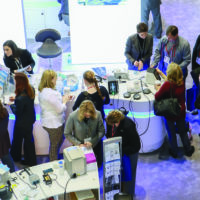 We’re pleased to announce that NDPL Cell Biologist Matthew Wilgo will be presenting at the upcoming Yankee Dental Congress on January 25, 2018.
We’re pleased to announce that NDPL Cell Biologist Matthew Wilgo will be presenting at the upcoming Yankee Dental Congress on January 25, 2018.
Yankee Dental Congress is an annual conference and exposition organized by the Massachusetts Dental Society. The event is held at the Boston Convention & Exhibition Center and attracts over 27,000 dental professionals from across the globe. Held over four consecutive days (January 24-28, 2018), this conference serves as the perfect platform for dental students, dentists, and hygienists to learn about the latest breakthroughs in the dental sector.
Mr. Wilgo’s presentation will educate attendees on the exciting field of cell biology and regenerative medicine, with a focus on dental pulp stem cells, and how they may one day influence dental practices. Matthew’s course also qualifies for 2 hours of continuing education credits.
Attendees will:
- Explore the basics of cell biology
- Understand what a stem cell is
- Discover where adult stem cells reside
- Analyze dental stem cell cultures
- Identify regenerative medicine and current research, trials, and treatments
- Discuss the ethics of regenerative medicine
- Explain cell banking and how you can preserve dental stem cells for future use
Registration for the 2018 Yankee Dental Congress is now open. This conference will take place January 24-28, 2018 at the Boston Convention and Exhibition Center.
The importance of dental pulp stem cells
 The stem cells found in dental pulp are poised to play an exciting role in regenerative medicine. Because of their ability to differentiate into a wide variety of cell types, dental pulp stem cells can factor into a broad range of treatments for a variety of conditions. Scientists are actively working with dental pulp stem cells to develop promising treatments for previously non-treatable diseases and conditions such as type-1 diabetes, Crohn’s disease, nerve and spinal cord injuries, Alzheimer’s disease, and Parkinson’s disease, to name a few. Dental pulp stem cells also show strong promise in treating a variety of dental and periodontal conditions.
The stem cells found in dental pulp are poised to play an exciting role in regenerative medicine. Because of their ability to differentiate into a wide variety of cell types, dental pulp stem cells can factor into a broad range of treatments for a variety of conditions. Scientists are actively working with dental pulp stem cells to develop promising treatments for previously non-treatable diseases and conditions such as type-1 diabetes, Crohn’s disease, nerve and spinal cord injuries, Alzheimer’s disease, and Parkinson’s disease, to name a few. Dental pulp stem cells also show strong promise in treating a variety of dental and periodontal conditions.
Because dental pulp stem cells come from adult human tissue, they avoid ethical questions that other sources of stem cell retrieval may trigger. Collection of dental pulp stem cells is easier, more cost-effective and less painful to the patient than other methods of mesenchymal stem cell recovery, such as adipose (fat) or bone marrow. Our NDPL Dentist Providers play a critical role in future stem cell therapies by helping their patients preserve this valuable, personal source of stem cells.
Click to find more information about the Yankee Dental Congress, Matthew’s talk, and also learn more about the work of The National Dental Pulp Laboratory.




